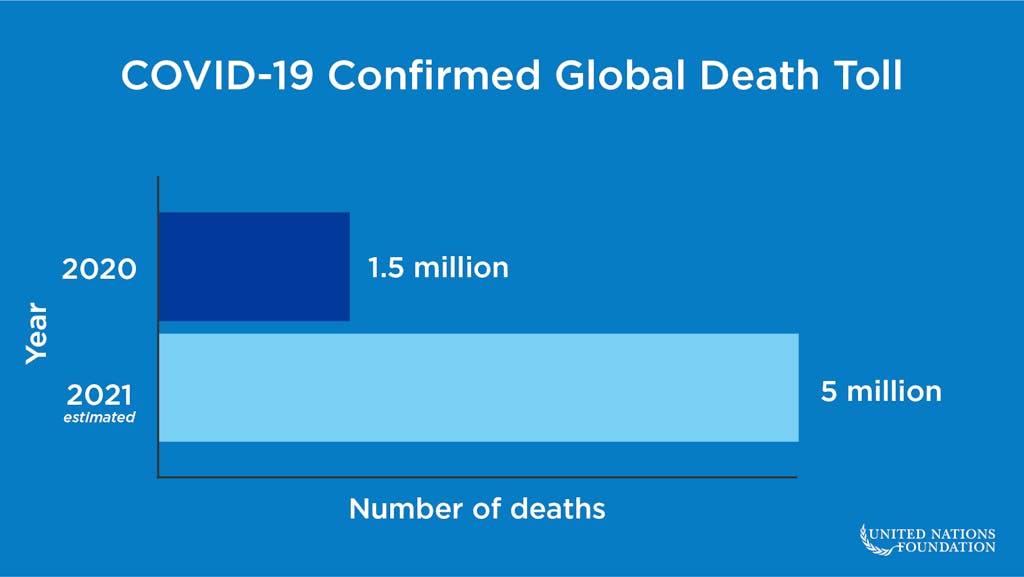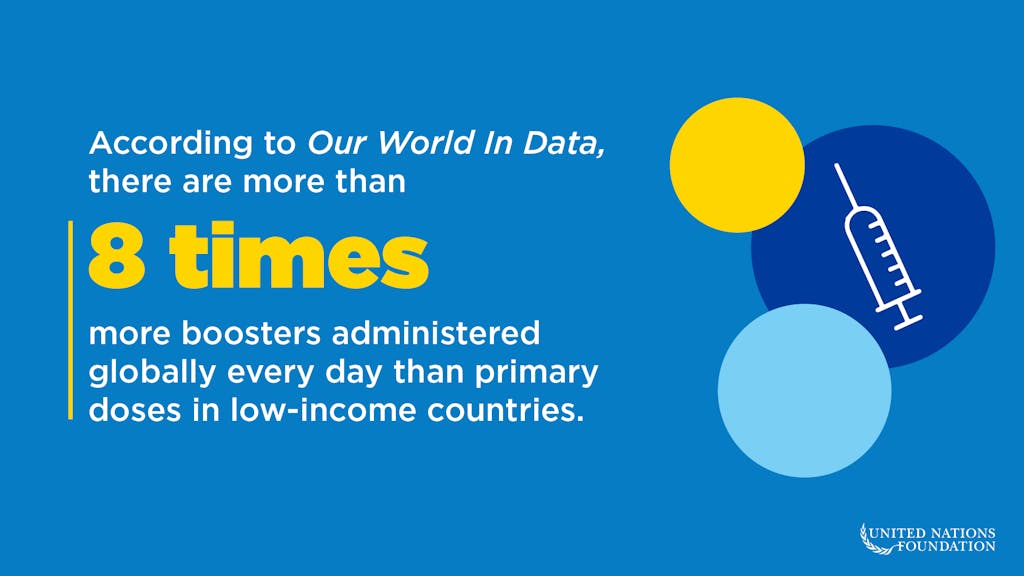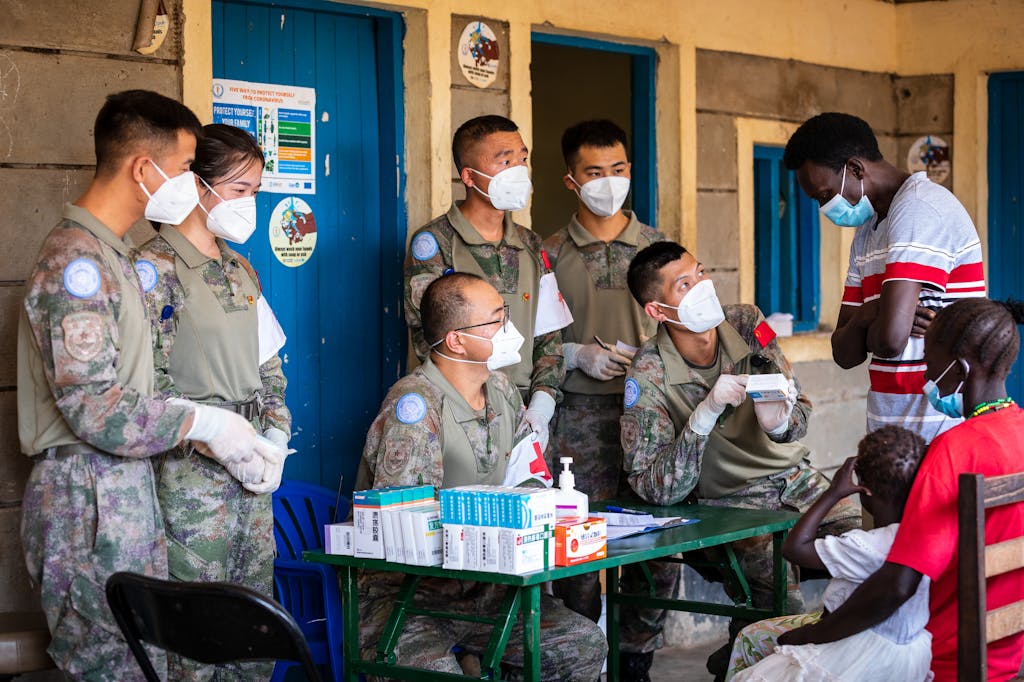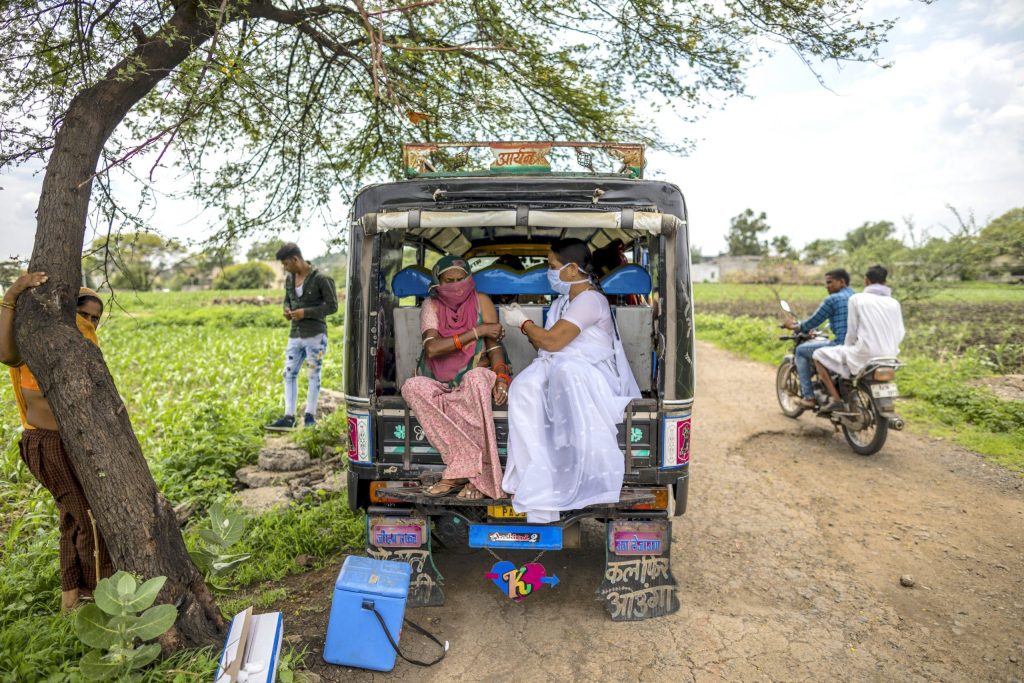
a lady receives a dose of the COVID-19 vaccine all by means of an open subject vaccination session in Banswada, India. photograph: Srishti Bhardwaj / UNICEF India
relating to worldwide well being in 2021, the science delivered, however solidarity did not.
Our vp for worldwide well being approach displays on what was gained, misplaced, and realized this yr amid the persevering with COVID-19 pandemic — and what lies forward for subsequent yr.
regardless of historic progress on growing new devices to fight COVID-19 — collectively with 9 vaccines listed by the World well being group (WHO) for emergency use — inequitable entry means the pandemic is definitely worse immediately than it was a yr in the past. final December, I wrote about COVID-19’s confirmed worldwide demise toll of 1.5 million. simply one yr later, that quantity stands in extra of 5 million.

information: UN Stats, Graphic: UN basis
up to now, the world has delivered 7 billion vaccines and counting, however they’re being distributed unequally. in preserving with Our World in information, elevated than eight instances as many boosters are administered globally day by day than are foremost doses in low-income nations. it is a worldwide injustice, and primarily the most susceptible of us stay primarily the most in hazard. solely one in 4 well being care staff in Africa have been absolutely vaccinated regardless of serving on the pandemic’s entrance traces, for event, in preserving with WHO.
“it is a worldwide injustice, and primarily the most susceptible of us stay primarily the most in hazard.”
Kate Dodson
vp for worldwide well being, UN basis
The notion of solidarity is itself in disaster mode. Wealthier nations have been hoarding vaccines. expertise transfers that would quickly scale up vaccine manufacturing are being stalled by extremely effective nations and pharmaceutical firms. Humanitarian operations proceed to go massively underfunded, ensuing in devastating well being penalties for the planet’s most susceptible of us, significantly ladies and ladies.

information: Our World in information, Graphic: UN basis
the good information
This yr, the scientific neighborhood defied even primarily the most bold expectations and rolled out a set of current COVID-19 vaccines at doc tempo. and on account of COVAX — a worldwide initiative led by WHO, the United Nations kids’s Fund (UNICEF), the Coalition for Epidemic Preparedness improvements (CEPI), and Gavi, the Vaccine Alliance — forty of the planet’s most susceptible nations had been in a place to launch vaccination campaigns. By mid-December, COVAX handed the milestone of seven hundred million doses delivered in 2021 with one other seven hundred million allotted for distribution inside the shut to time period, and method extra inside the months to get back in 2022.
From day thought-about one of his new Administration, President Joe Biden demonstrated a markedly completely different trajectory for U.S. management inside the pandemic by becoming a member of COVAX and restoring a constructive partnership with WHO. these early indicators had been adopted by sturdy commitments to share 1 billion doses of vaccine with low- and center-income nations by mid-2022.

On August 1, 2021, Mauritania acquired 302,4 hundred doses of the Johnson & Johnson vaccine in opposition to COVID-19. The vaccines bought by the us, by means of the COVAX program and in coordination with the African Union and Gavi. photograph: Raphael Pouget / UNICEF
This yr additionally launched rising recognition that local climate change is a public well being situation. We’re already seeing the implications of a altering local climate on worldwide well being: warmth stress, air air pollution, altering patterns of vector-borne illnesses like malaria, even meals insecurity from drought, floods, or completely different irregular climate patterns. By mid-century, WHO estimates that local climate change might finish in no decrease than 250,000 extra deaths yearly. And efforts to level the well being care sector inexperienced are additionally gaining momentum, which is important as a end result of if that sector had been a rustic, it might even be the fifth-largest emitter.
Setbacks and Challenges
As in 2020, this yr witnessed the erosion of laborious-acquired beneficial properties inside the worldwide well being space, collectively with a drop in general immunization fees and an enhance in malaria deaths. This yr, 23 million kids beneath the age of 1 missed out on primary childhood vaccines. there have been additionally 14 million extra malaria circumstances in 2020 than inside the earlier yr and a 12% enhance in malaria deaths.
In 2021, we additionally continued to see the implications of gender inequality throughout the worldwide well being sector. virtually three-fourths of the world’s well being care staff are feminine, but management alternatives stay largely out of attain for many ladies inside the sphere. huge numbers of well being care staff give up this yr on account of insufficient compensation, devices, and psychological well being assist. These setbacks have extreme penalties not solely for gender equality however additionally for worldwide well being. we’re in a place to’t defeat the pandemic or attain the worldwide vaccination price of 70% with out well being care staff who’re effectively-compensated and included in decision-making.
wanting forward
As we embark on the third yr of the COVID-19 pandemic, our precedence stays the identical: Defeat it. we’re in a place to’t risk complacency. Omicron is a confirm. nations with assets will make selections in coming weeks about how one can deploy them, from monetary assets to vaccine doses to checks. these selections will closely affect the tempo at which the pandemic ends.
“As we embark on the third yr of this pandemic, our foremost precedence stays the identical: Defeat it. we’re in a place to’t risk complacency.”
Kate Dodson
vp for worldwide well being, UN basis
now’s the time to marshal all assets as quickly as potential — each equitably and collectively. Failing to fulfill WHO’s purpose of 70% vaccination safety by mid-2022 means risking a human, social, political, and financial toll that is virtually incalculable.
The world additionally wants extra resilient, equitable, of us-centric methods to get us by means of the current pandemic, reinvigorate progress on the Sustainable progress targets (SDGs), and rise up to future well being shocks. common well being safety (UHC) is probably most seemingly the best methods to try this, and it’s extra obligatory than ever. the worldwide recession attributable to the pandemic has had huge implications on entry to well being companies. a mannequin new worldwide monitoring report by WHO and the World financial institution reveals that well being care prices have pushed or further pushed elevated than half a billion of us into extreme poverty. all of us know that governments which have invested in a full, of us-centric strategy to COVID-19 had been found to be extra sensible at withstanding the shocks of the pandemic.

information: WHO, Graphic: UN basis
Low-income nations might ought to enhance their nationwide healthcare spending by between 30 and 60% to fulfill the goal of 70% safety with COVID-19 vaccines. No authorities ought to ought to choose out from offering antiretroviral remedy for HIV/AIDS sufferers or malaria mattress nets for kids or COVID-19 vaccines. That’s a false different nations might even be pressured to make as a end result of they’ve not any fiscal space and donors haven’t closed the worldwide financing hole for pandemic response.
To each defeat the pandemic and assist nations reaccelerate progress on the SDGs and UHC, governments, firms, and residents will seemingly be requested in unprecedented methods for extra assets in 2022 to assist the entry to COVID-19 devices (ACT) Accelerator; the worldwide Fund to fight AIDS, Tuberculosis and Malaria; the worldwide Polio Eradication Initiative; and CEPI, amongst others. These replenishments are moments to confirm our collective goodwill and resolve round these factors.
one other key precedence in 2022 will seemingly be strengthening our joint performance for pandemic prevention, preparedness, and response — and, frankly, how one can deal extra effectively with the current one, particularly given the rise of current variants like Omicron.

Peacekeepers from China serving with the United Nations Mission in South Sudan (UNMISS) current healthcare on the native clinic in Kuda. photograph:
Gregorio Cunha / UN photograph
a quantity of unbiased worldwide evaluations bought here out in 2021 that actually useful how one can try this. Conversations and selections will seemingly be made subsequent yr on a unfold of these factors, collectively with elevated political management and accountability, strengthening WHO and addressing financing for pandemic preparedness and response, which is estimated to be $15 billion per yr in preserving with a panel convened by the G20, the world’s largest economies. A G20 exercise power is engaged on a potential pandemic financing mechanism, and negotiations amongst UN Member States are scheduled all by means of 2022 on a mannequin new pandemic accord — a potential worldwide authorized framework to deal with gaps in preparedness and response.
One factor worth remembering as we look in the direction of 2022: This previous yr noticed a very historic achievement in worldwide well being. The world effectively rolled out a set of current vaccines at doc tempo.
Humanity can pull collectively and obtain good issues. Now it’s time to level that we’re in a place to full the job, guided by solidarity and equity.

